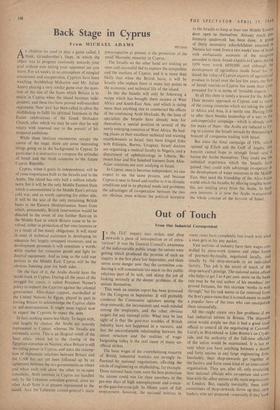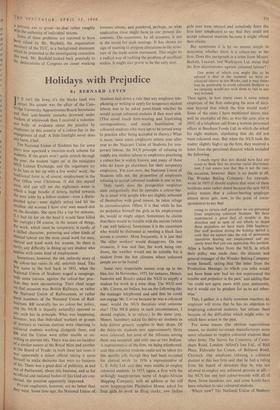Out of Touch
From Our Industrial Correspondent Is the TUC inquiry into strikes and shop stewards a piece of introspection or of extra- version? It was the General Council's awareness of the unfavourable public image the unions were getting which produced the promise of such an inquiry in the first place last September, and there seems some danger uow that the committee con- ducting it will concentrate too much on this public relations part of its task, and skimp the job of looking seriously at the deeper problems of the unions themselves.
This week an interim report has been promised for the Congress in September. It will probably condemn the Communist agitators among the shop-stewards, the inconsistent and weak-minded among the employers, and the other obvious targets for any rational critic. What may be lost sight of is that the post-war troubles of British industry have not happened in a vacuum, and that the uncomfortable relationship between the union structure and the realities of wage- bargaining today is the real cause of many un- official strikes.
The basic wages of the overwhelming majority of British industrial workers are strongly in- fluenced- by national negotiations, affecting the whole of engineering or shipbuilding, for example. These national basic rates were the best protection the unions could win for their members in the pre-war days of high unemployment and a-man- at-the-gate-for-your-job. In fifteen years of full employment, however, the national minima in many cases have completely lost touch with w hat a man gets in his pay packet.
Vast sections of industry have their wages coil' trolled by piece-work systems and other for ,Ens of payment-by-results, negotiated locally, and usually by the shop-stewards in an individual factory. This job is the secret of much of the shop-steward'sprestige. The national union officer who helps to get 3 or 4 per cent, more on the basic rate may be the real author of his members' ity- proved fortunes, for this increase 'works its waY through,' but his task seems so far removed front the firm's piece-rates that it is much easier to make a popular hero of the man who can manipulate them successfully.
• All this might create very few problems if we had industrial unions in Britain. The shipyard union would simply see that it had a good local official to control all the negotiating at Camilla Laird's in Birkenhead or John Brown's on Clyde side, and the authority of the full-time officials of the union would be. maintained. It is not so easy when you have anything between a dozen and forty unions in any large engineering kill Inevitably, their shop-stewards get together at the factory and form some kind of an inter-uni n 0 organisation. They are, after all, only emulating their national officials who co-operate' and corn- bine with the other unions at the main negotiations in London. But, equally inevitably, these joint committees of shop-stewards throw up their wan leaders, who are prepared—especially if they have a Political axe to grind—to deal rather roughly With the authority of individual unions. Some of these problems are reported to have been raised by Mr. Boyfield, the organisation secretary of the TUC, in a background document Which he presented to the investigating committee this week. Mr. Boyfield looked back pensively to the declarations of Congress on closer working between unions, and pondered, perhaps, on what application these might have to our present dis- contents. The committee, by all accounts, is not in the mood for such musings. It has shown no sign of wanting to propose alterations in the struc- ture of the trade union movement. This might be a radical way of tackling the problem of unofficial strikes. It might also prove to be the only way.



































 Previous page
Previous page